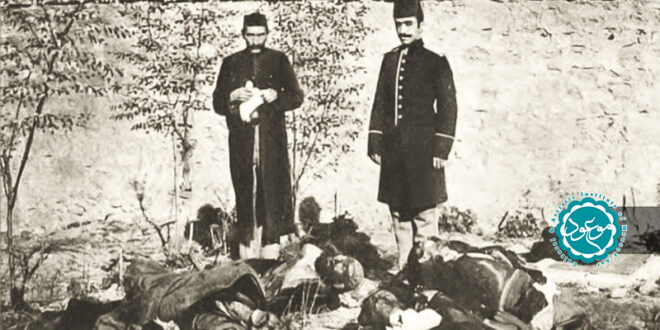Mouood: The “Great Famine” in 1296 AD is a terrible event in the history of Iran. Many have forgotten, but history does not forget what harm the foreigners did to the Iranians; The black catastrophe that drove some to the point of insanity and made them eat human flesh!
The Great Famine in Iran and Brits role
Fars News Agency History Group – Amin Rahimi: World War I started in 1293 and Iran declared neutrality. It was the period of Ahmad Shah Qajar and Qajar was in a period of decline and Iran was a weak and defenseless country. But then very easily and, of course, contrary to international law, neutral Iran in the war was occupied by Britain from the south and Tsarist Russia from the north.
It is clear that all the soldiers brought by the foreigners wanted bread to eat, and so the Iranian grain was confiscated in different cities and in different ways, and food and grain, which were the main food of the Iranians, became very expensive.
The British themselves later admitted that they could bring food for their troops from other parts of the world, but “if we had not collected Iranian food, we would have brought it ourselves, which occupied a large part of the shipping fleet!” Later, foreign coercion to seize Iranian grain led to a famine in Iran in 1296;
The “Great Famine” that lasted 2 years and was accompanied by illness and hunger and a thousand rewards and reduced the population of 20 million people in Iran by about 8 million people! It is estimated that more than 3 million people have died of starvation alone.

Jamalzadeh’s story about the famine
What really happened during the Great Famine in Iran? Mohammad Ali Jamalzadeh, known as the “father of modern Iranian fiction,” describes the story of the Great Famine as follows: They passed slowly through the city walls and entered it. One was named Famine, the other was Spanish flu and the last was cholera.
The poor, old and young, collapsed like autumn leaves against the onslaught of these ruthless riders. No food was found. People had to chew and eat as much as they could. Soon cats, dogs, and crows could not be found. Even mice had lost their offspring. The leaves, grass, and roots of the plant were traded like bread and meat. Homeless dead bodies were scattered all over the corpses. “After a while, people started eating the meat of the dead.”

Donohoe narratives of hunger
Read the rest of the story of the Great Famine of Iran by “Martin Henry Donohoe”, a British journalist and intelligence officer who came to Iran in 1297 AD, in the middle of the Great Famine, and passed through different cities and villages and wrote his observations in a book entitled “Mission to Persia”.
The narratives that Donohoe tells are a story that deserves to be wept and deserves a lesson; “On the other side of the front, I had heard a lot about the dire economic situation in Iran and the lack of food, but now, after facing this horrific fact, I was realizing it for the first time.
It has fallen on public roads. Between their stiff and dry fingers are still the grasses they have plucked from the side of the road or the roots which they have taken from the fields, and with which they have sought to alleviate the torment of famine and death by starvation. Footprints of skin and bones, with sunken eyes, crawling on all fours on the road in front of an oncoming car, begging for a piece of bread without talking…
At Qasr Shirin, where we had a shortstop, a hungry crowd surrounded us and demanded food. The miserable woman with a child next to her begged us to save her child. We gave her half a can of canned meat and some biscuits and she asked God to forgive us. We were moved by her maternal concern; “Although it was clear that she was suffering from extreme hunger, she did not take a bite out of her own throat until the child was full.”
And this is another story from another city: “On the banks of the river, along the road, the hungry were starving… It seemed that everyone was in the last stage of physical exhaustion. It turned out that some of them were done. They could no longer do anything, they lay on the ground, waiting for the angel of the mercy of death to come and deliver them. Some of them were still desperately hanging on to the loose rope of life. “They crouched on the ground and looked for a handful of plant roots or rough grass to perhaps alleviate the horrible and endless hunger.”
And another story: “Hamedan was a city of terror. The unburied bodies of famine victims, including women, people, and children, were dumped in the streets and around British settlements… Survivors whose hunger has turned them into skin and bones have become vegetarians and eat grass on the ground. Experience has shown that eating this way over a short time can be as deadly as not eating because it causes inflammation of the peritoneum and leads to a painful and gradual death.”

The last narrative
Among Donohoe narratives, the last is more terrifying; bitter like poison. He wrote:
“But worse things were on the way. Hungry people, suffering from malnutrition, had turned to eat human flesh. Cannibalism is a crime that is still unknown in Iran, therefore there is no punishment for it in the laws of this country. The culprits are often women, and the victims are children abducted from their homes or trapped in a crowded market.
Mothers are afraid to leave their children alone to beg for bread because their children may be abducted and eaten in their absence. Each time I walked in a narrow market or a narrow passage full of potholes, seeing so much public human misery there made me feel a disgusting fear.
Children with skin and bones would gather around a person begging for a piece of bread or money with which to buy bread, and when you gave them some black money, you could not get out of your mind the torturous thought that perhaps their fate, too. Sooner or later, getting out of the food pot is…
Nazmieh (Police) has arrested several offenders. Eight women have been arrested for confessing to abducting and eating several children, and their excuse was that hunger had forced them to commit such a horrible crime…
The next day, on May 8, another more horrific case of cannibalism was discovered. Two women, a mother, and a daughter were arrested with bloody hands. They killed an eight-year-old girl and were cooking for her, which stopped the order of continuing this terrible feast. “The remaining half-baked pieces were thrown in a basket and an angry mob took the two poor criminals to order… other women were also arrested for child molestation.”
 Mouood Mouood English Edition
Mouood Mouood English Edition

